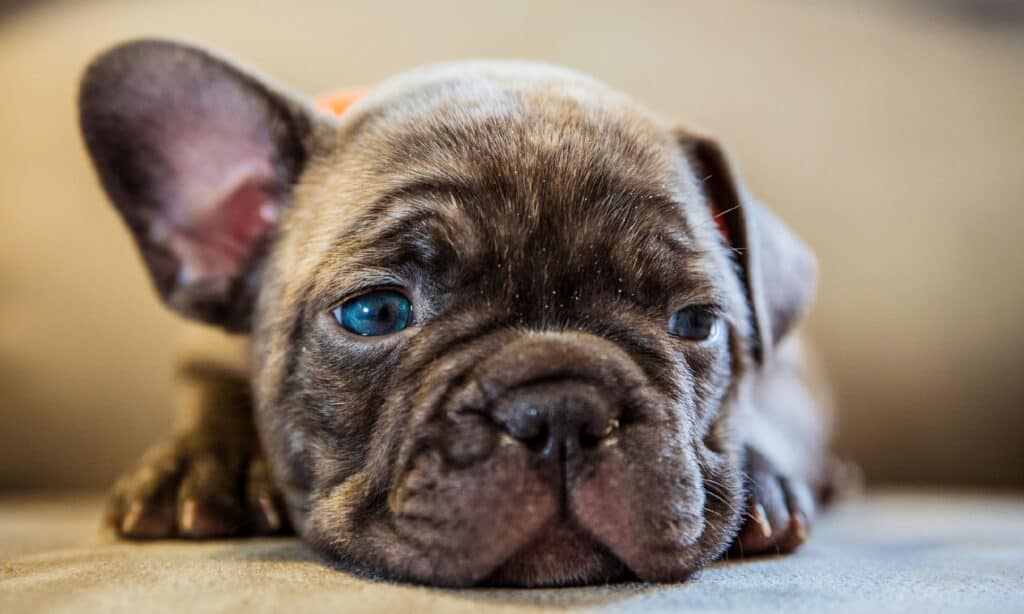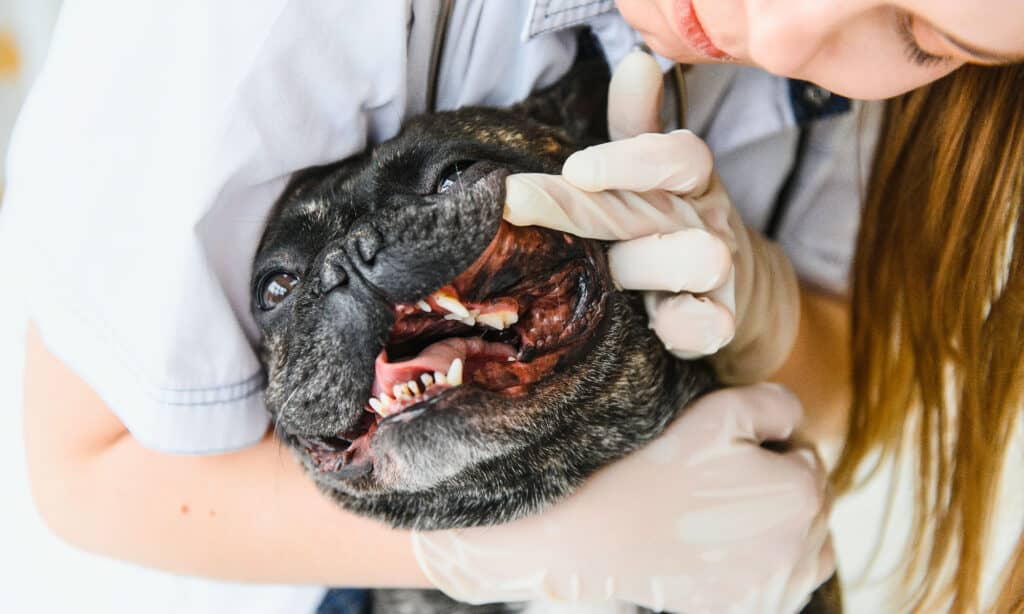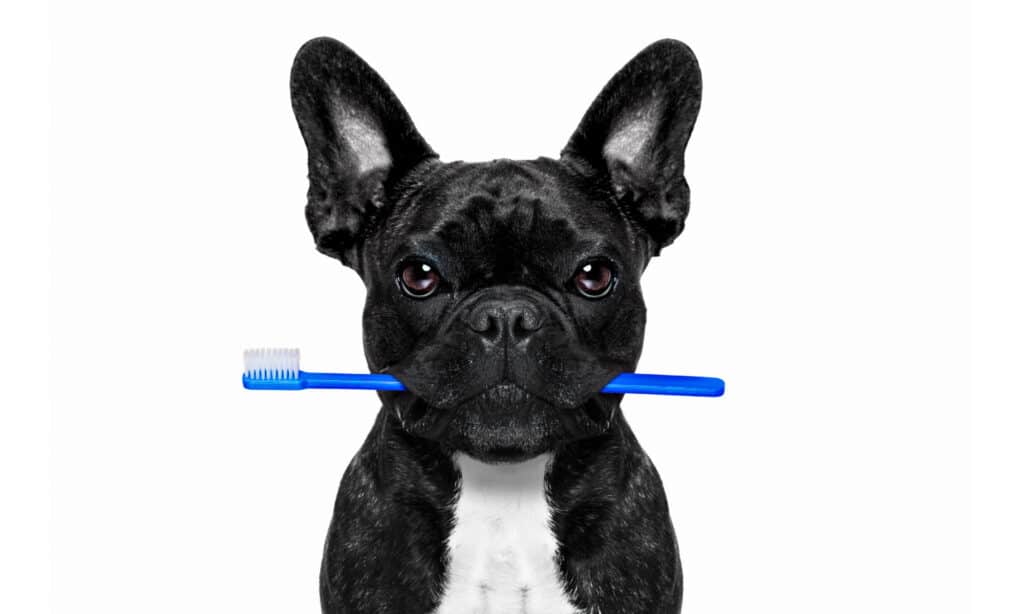Dogs, also known as “man’s best friends,” come in different breeds, shapes, and sizes. French Bulldogs are noticeably small and short, but despite this, they have a substantially muscular body. Otherwise called Frenchies, the breed gets along well with different breeds and is patient and kind with its owners. Though they may have a tendency to be stubborn, French Bulldogs are amiable and human-oriented, which makes them simpler to teach.
Despite all these, raising a Frenchie is more stressful than some other dogs. The reason for this is that this dog breed has several health issues that need special care. The challenge of understanding their dentition and, consequently, knowing what to feed them is also a concern in addition to their health.
French Bulldog Milk Teeth

Frenchie puppies, like most dogs, have just 28 milk teeth, also known as deciduous teeth.
©iStock.com/Lisa Covalero
Like other mammals, dogs, in general, do not give birth to their puppies with teeth. When French bulldogs give birth, they feed their pups milk from their nipples for a few weeks. Their first milk teeth only start to become obvious after around three weeks. Frenchie puppies, like most dogs, have just 28 milk teeth, also known as deciduous teeth. The first of these teeth to appear is usually the canine and the rest begin to grow after three to five months. At this puppy stage, Frenchies do not have molars. Their dentition consists of 14 upper and lower teeth- 4 canine, 12 incisors, and 12 premolars.
Most Frenchies experience pain when their milk teeth start to grow out. During this period, they try to find things like toys to constantly scratch their gums with. Also, while the teething process continues, it is not uncommon for Frenchies to drool even more because of the constant stimulation of their gums. Just a heads up, this teething discomfort also returns when French bulldogs start to grow adult teeth.
French Bulldog Adult Teeth

Adult French bulldogs have 42 teeth.
©Hryshchyshen Serhii/Shutterstock.com
As Frenchies grow, there is a significant change in their dentition. Although their puppies have just 28 teeth, adult French bulldogs have 42. Frenchies lose their baby teeth the same way humans do. It is completely natural and occurs so that as their skull and jaw get larger, their larger adult teeth can erupt.
From 12 weeks (three months), French Bulldogs begin to lose their baby teeth. Usually, these teeth fall out when puppies chew on toys. They start to fall out as the larger adult teeth that are developing underneath are pushing them out. By the time a French bulldog puppy reaches 8 months old, it will have lost all of its baby teeth and have a full set of 42 adult teeth in their proper positions- 20 at the top and 22 at the bottom.
Do French Bulldogs Have Dental Problems?

The majority of dental issues that Frenchies have begin with tartar buildup on the teeth and develop into an infection of the gums.
©Javier Brosch/Shutterstock.com
Like humans and other animals, dogs sometimes have dental problems, and French Bulldogs have even more chances of having dental problems than other dogs. For most dogs, dental problems start with the buildup of plaque in their teeth. The accumulation of plaque on teeth might eventually result in gum disease, infected teeth, or even tooth loss. The simplest approach to avoid this, though, is to frequently brush your dog’s teeth.
The majority of dental issues that Frenchies have begin with tartar buildup on the teeth and develop into an infection of the gums and tooth roots. French bulldogs will likely lose their teeth and run the risk of harming or damaging their kidneys, liver, heart, and joints if this problem is not treated or prevented. The lifespan of a French Bulldog might even be shortened by one to three years.
Persistent teeth are another issue that can occasionally affect dogs. This happens when the milk teeth continue to cling on even after the adult tooth has started to sprout. Persistent teeth can cause crowding or even cause the adult tooth to erupt in an unusual position since the milk tooth is still in its proper location. When this occurs, French bulldogs may have an unnatural bite that makes feeding challenging.
Up Next:
Bulldog Teeth: Everything You Need to Know
French Bulldog Lifespan: How Long Do French Bulldogs Live?
The photo featured at the top of this post is © iStock.com/Firn
Ready to discover the top 10 cutest dog breeds in the entire world?
How about the fastest dogs, the largest dogs and those that are -- quite frankly -- just the kindest dogs on the planet? Each day, AZ Animals sends out lists just like this to our thousands of email subscribers. And the best part? It's FREE. Join today by entering your email below.
Sources
- French Bulldog Owner, Available here: https://frenchbulldogowner.com/when-do-french-bulldogs-lose-their-baby-teeth/
- Doggysaurus, Available here: https://doggysaurus.com/french-bulldog-puppy-teething-stages/
Thank you for reading! Have some feedback for us? Contact the AZ Animals editorial team.






